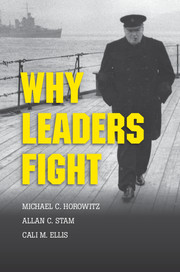Book contents
- Frontmatter
- Contents
- List of Figures
- List of Photographs
- List of Tables
- Preface
- Introduction
- 1 How Leaders Matter
- 2 Systematically Evaluating Leader Risk
- 3 Leader Risk across Geography and Time
- 4 The Experiences That Matter I: Military/Rebel Status, Age, and Education
- 5 The Experiences That Matter II: Childhood, Family, and Gender
- 6 “L’état, c'est moi” – or Is It?
- Bibliography
- Index
6 - “L’état, c'est moi” – or Is It?
Published online by Cambridge University Press: 05 October 2015
- Frontmatter
- Contents
- List of Figures
- List of Photographs
- List of Tables
- Preface
- Introduction
- 1 How Leaders Matter
- 2 Systematically Evaluating Leader Risk
- 3 Leader Risk across Geography and Time
- 4 The Experiences That Matter I: Military/Rebel Status, Age, and Education
- 5 The Experiences That Matter II: Childhood, Family, and Gender
- 6 “L’état, c'est moi” – or Is It?
- Bibliography
- Index
Summary
“I am the state.”
– Louis XIV (1638–1715)We have two things left to accomplish before closing this book. First, there is a serious question that we have assiduously avoided to sustain our focus on leaders and their personal attitudes and beliefs about risk and disinhibited behavior. For consistency's sake, we have focused solely on the decision to threaten or use military force against other nations, but what happens when a war occurs? Do the leaders who engage in what most would judge to be high-risk behavior take these risks prudentially, or are they foolhardy? To answer these questions, we turn to the relationship between leaders’ risk scores and the outcomes, costs, and durations of the wars in which they participate. Following that, we lay out the utility of this research agenda for the public policy world, as well as for future academic investigation.
Risk is a funny thing. The people who engage in what others view as high-risk behavior usually do not see their behavior as particularly dangerous for themselves. Rather, they tend to see their choices as something that might be foolhardy for others, but they also believe that either through training or superior talent, they have a better way of managing or ameliorating danger than everyone else. So, for example, most skydivers do not see the sport nearly as risky as does the rest of the earth-bound population. To be sure, there are risks involved in jumping out of a plane, but trained skydivers are willing to place their trust in their equipment and training. The skydivers’ critics see the choice as reckless or foolhardy. Driving at high speed is another example. While it is a fact that at higher speeds, accidents are associated with greater vehicular damage and occupant harm, it does not follow that driving quickly places everyone at equal risk. Skilled drivers can drive safely at seventy miles per hour or more. Unskilled and inattentive drivers put themselves and others at great risk at far slower speeds. Tragically, the substantial majority of drivers in America all believe they are better than average drivers, something that cannot possibly be true – and therein may lie the rub for politics. Are some risk acceptant leaders substantially better at judging the risks of military action, or are they simply more cost tolerant than their counterparts?
- Type
- Chapter
- Information
- Why Leaders Fight , pp. 178 - 187Publisher: Cambridge University PressPrint publication year: 2015



